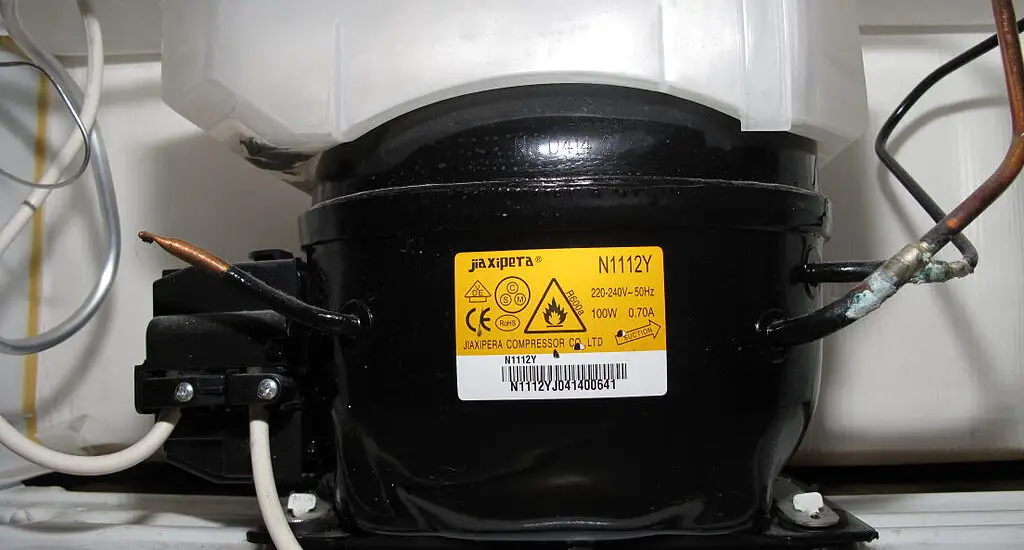New refrigerator compressor noise? Don’t worry! In this article, we’ll guide you through everything you need to know to pinpoint and address the issue.

Table of Contents
Understanding the Basics of a Refrigerator Compressor
Before we start troubleshooting, it helps to know a bit about your refrigerator’s star player – the compressor. Acting like the heart of your fridge, it’s the component responsible for maintaining the perfect chill.
What is a Refrigerator Compressor?
The compressor is an essential part of your fridge’s cooling system. This powerful little device compresses the refrigerant gas, turning it from a low-pressure gas into a high-pressure gas. As the gas moves through the system, it absorbs and dispels heat, keeping your groceries fresh and your ice cream perfectly frozen.
Expected Noise Levels From a New Refrigerator Compressor
So, what’s a ‘normal’ noise for a compressor to make? Well, you’ll usually hear a soft hum or a gentle buzz when it’s working. But if it’s brand new and sounds like a grumbling bear, you might have a problem. Identifying these noises early can help you get ahead of any issues and keep your refrigerator running smoothly.
Causes and Identification of New Refrigerator Compressor Noise
There’s a wide range of noises that a refrigerator can make, and identifying them can be like learning a foreign language. So, let’s translate some of these ‘fridge speak’ into English, shall we?
Unusual Noises from a New Compressor
If your new refrigerator is clicking, buzzing louder than usual, or humming like a choir, there’s a good chance that there’s something awry. These sounds are your fridge’s way of crying out for help, so it’s time to play detective and find out what’s going wrong.
What Causes Compressor Short Cycling?
Short cycling is when your compressor turns on and off rapidly – it’s like the refrigerator is doing a high-intensity interval training workout, and trust me, that’s not good. This can lead to those strange noises you’re hearing.
Thermostat Issues
It might be as simple as a wonky thermostat. You see, the thermostat is your refrigerator’s brain, telling it when to cool down. If it’s malfunctioning, it can send the compressor into overdrive.
Overheating
Is your fridge working up a sweat? Overheating can also cause short cycling. If the compressor gets too hot, it might start working overtime, leading to those extra noise levels.
Refrigerant Problems
Finally, if your fridge is low on refrigerant or there’s a leak, it might cause the compressor to short cycle. It’s like trying to run a marathon without enough water – it’s not going to end well.
How to Diagnose New Refrigerator Compressor Noise
Now that we’ve decoded the potential causes of those annoying sounds, let’s figure out how to find out which one is troubling your fridge.
Tools and Techniques for Diagnosing Compressor Noise
Getting down to the root of the noise issue may require some detective tools and techniques. These can range from using a mechanic’s stethoscope to listen to the refrigerator’s internal sounds to closely observing the frequency and timing of the noise. Don’t worry – you don’t have to be Sherlock Holmes to solve this case!
When to Call a Professional
If you’ve tried to play detective but can’t identify the problem, it might be time to call in the experts. Remember, messing around with a refrigerator’s internal components can be dangerous if you’re not sure what you’re doing. So, if in doubt, don’t hesitate to get a professional on the case.
Check out these other related articles…
Ice Maker Compression Fitting Leaking: Fixed in 4 Easy Steps
Compressor Icing Up: Causes & 3 Proven DIY Solutions
Uline Ice Maker Compressor: Your Comprehensive Guide
Ice Machine Compressor Not Starting: Reasons & 4 Sure Fixes
Quietest Refrigerator Compressor: Your Ultimate 411 Guide
How to Fix Short Cycling and Associated New Refrigerator Compressor Noise
Once you’ve identified the problem, it’s time to roll up your sleeves and get down to business. Let’s see how you can fix some common issues causing your new refrigerator compressor to make all that racket.
Fixing Thermostat-Related Issues
If the problem is with the thermostat, you might need to replace it. And while it sounds daunting, it’s actually a pretty straightforward process. You’ll just need to order the right part and then follow the manufacturer’s instructions to install it. Easy peasy, right?
Addressing Overheating Problems
If your refrigerator’s working up a sweat, you’ll need to cool it down. This could mean cleaning the condenser coils, moving the fridge to a cooler spot, or ensuring it’s not overloaded. Remember, your fridge needs its personal space just like we do!
Managing Refrigerant Problems
Got a refrigerant leak or need a recharge? This is a job best left to the professionals. Messing around with refrigerant can be dangerous and is not recommended for DIY enthusiasts. So, if you suspect a refrigerant issue, give your local technician a call.
Checking for Refrigerant Leaks
While it’s not recommended to fix refrigerant leaks yourself, you can still check for them. If you notice a sweet, chloroform-like smell around your fridge or see oily residue near the compressor, you might have a leak on your hands. And if that’s the case, it’s time to call in the experts.
Recharging the Refrigerant
Recharging the refrigerant is also a task for a professional. While it may seem like a simple process, it involves handling potentially harmful substances and should be done with utmost caution. If your fridge needs a recharge, don’t try to be the hero – let the professionals handle it.
In the end, while a noisy new refrigerator compressor might be a nuisance, with a little knowledge and some detective work, you can get to the bottom of it and keep your fridge running as it should. Just remember, if in doubt, don’t hesitate to call in the pros.